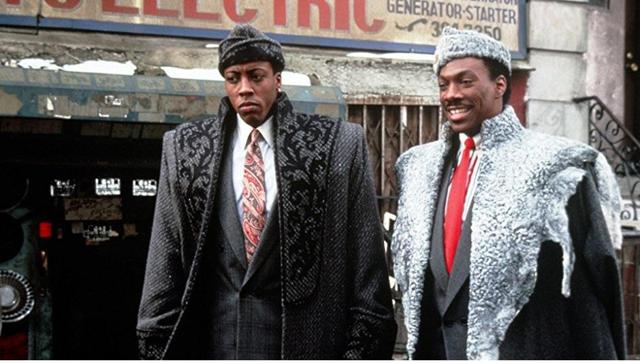
From the movie "Coming To America." Source: Amazon.com
Gilead (NASDAQ:GILD) acquired Kite Pharma for $12 billion, and the novel CAR-T therapy received FDA approval within months. For a while, it seemed like Gilead would have the U.S. CAR-T market all to itself. However, Novartis's (NYSE:NVS) Kymriah was recently approved by the FDA to treat large B-cell lymphoma:
U.S. regulators approved Novartis�� cell therapy Kymriah for treatment of patients with a second type of blood cancer, large B-cell lymphoma, that has worsened despite two or more earlier lines of therapy, the Swiss drugmaker said on Tuesday.
The new indication puts Kymriah in direct competition with Gilead Sciences�� Yescarta, which was approved by the U.S. Food and Drug Administration in October for treatment of adults with diffuse large B-cell lymphoma who have failed to respond to other treatments.
Both Kymriah and Yescarta are chimeric antigen receptor T-cell therapies, or CAR-Ts, which reprogram the body��s own immune cells to recognize and attack malignant cells.
Kymriah, given as a one-time treatment, was approved in August for patients up to age 25 with acute lymphoblastic leukemia, the most common form of childhood cancer in the United States.
Kymriah could stymie sales of Yescarta, one of the few remaining catalysts Gilead possesses. Below, I will parse through the implications of Kymriah's U.S. arrival.
The SituationThe Kite Pharma acquisition received a lot of fanfare from GILD bulls. When the deal was completed in August 2017, Kite's revenue was expected to be approximately $200 million in 2018 and to grow to about $1.2 billion by 2021. Yescarta's $1.2 billion of peak annual revenue paled in comparison to Gilead's HCV revenue, which was generating $2.9 billion per quarter. I thought Gilead's prospects were still dim amid its shrinking HCV franchise.
Yescarta is expected to be available for critically care cancer patients for whom other treatments may not have worked. In some respects, Yescarta could be their last option. In Q4 2017, Cowen estimated about 5,300 patients would be good candidates for Yescarta annually. However, given the need for Gilead to roll out commercial centers capable of treating patients, only about 1,200 patients were likely to be treated by Yescarta this year.
Another potential bottleneck could be the cost of in-hospital stays versus outpatient treatment, and how much of the tab Medicare will pick up. We need more clarity from Gilead's management on these issues given their complexities.
Kymriah Could Stymie Yescarta Sales
In Q1 2018, Yescarta delivered in spades with revenue of $40 million. Management intimated there was an increase in patient enrollment, and that the company was "on track to have enough centers certified to treat 80% of Yescarta-eligible patients in the United States by the middle of the year." If that means Gilead will have the capacity to treat 4,000 patients per year, then it could equate to annual revenue of about $1.5 billion. This would exceed the $884 million in HCV revenue the company generated in Q1.
However, it may have to share that $1.5 billion revenue potential with Novartis. Kymriah generated $12 million in revenue in Q1 2018. I understand that (1) the treatment is priced at $475,000 for pediatric leukemia patients, and (2) Novartis bills for Kymriah only if patients respond within 30 days of treatment. Pursuant to lymphoma patients, Novartis is expected to match Yescarta's $373,000 price point with no outcome-based concessions.
In effect, the two treatments will go head-to-head at the same price point. Yescarta's Q1 revenue puts it on an annual run rate of $160 million. It could exceed its current trajectory, yet may have to share a large part of an annual $1.5 billion market with Kymriah.
Will Biktarvy Step Up?
Gilead's Q1 2018 total revenue of $5 billion down 14% sequentially. HCV sales fell 33% due to an onslaught from AbbVie's (NYSE:ABBV) Mavyret. AbbVie's total HCV revenue grew 80% sequentially in Q1, and that likely came out of Gilead's hide. Even more shocking was that Gilead's non-HCV revenue fell 10% Q/Q, and that included the $40 million contribution from Yescarta.
The company's latest HIV treatment, Biktarvy, could change that. The single-tablet regimen received FDA approval only in February 2018, yet still managed to generate $35 million in revenue during the quarter. Biktarvy is expected to compete head-to-head with GlaxoSmithKline's (NYSE:GSK) two-drug HIV combo. The lion's share of Biktarvy sales came from Genvoya switches and certain HIV drugs from GSK. That said, Biktarvy and Yescarta will likely drive the narrative in Q2.
ConclusionYescarta and Biktarvy will grow, but can they replace HCV's huge margins? GILD is up 6% Y/Y, but until the company can put its $32 billion cash hoard to work, the stock remains a Sell.
Disclosure: I am/we are short GILD.
I wrote this article myself, and it expresses my own opinions. I am not receiving compensation for it (other than from Seeking Alpha). I have no business relationship with any company whose stock is mentioned in this article.
No comments:
Post a Comment